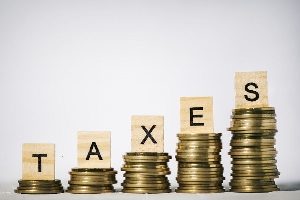 Government plans to repeal certain taxes
Government plans to repeal certain taxes
Development finance and economics expert, Dr. Eric Boakye Yiadom, has explained the need to broaden the tax net as a key strategy for driving economic growth.
Speaking to the B&FT, he said this is crucial – especially as government plans to repeal certain taxes as part of its reforms.
During the launch of his 2024 manifesto, Ghana’s President John Dramani Mahama vowed to rescind several taxes within his first 120 days in office.
These include the COVID-19 levy, E-Levy, 10 percent betting levy, emissions levy and import duties on vehicles and equipment for industrial and agricultural purposes. He argued that these taxes have placed undue burdens on Ghanaians and businesses.
Data show that the E-Levy generated approximately GH¢1.1billion in 2023, with projections of GH¢2.1billion for 2024. The emissions tax contributed GH¢522million in 2023 and is expected to reach GH¢1billion by 2025. Similarly, the COVID-19 levy is anticipated to generate GH¢3.97 billion in 2025, up from GH¢3.1billion for 2024, while the betting tax is projected to contribute about GH¢1.2billion.
The abolition of these levies is expected to create a significant revenue shortfall, which could severely affect key sectors of the economy, heighten fiscal pressures and force government to rely on increased borrowing. This, in turn, may expose the country to greater economic risks.
Dr. Boakye Yiadom believes that broadening the tax net by ensuring everyone contributes to direct taxes can help prevent economic crises if these levies are abolished.
“Government should have innovative means of trying to fill these gaps. Introducing new taxes will be difficult for the business environment, hence the need to find ways of bringing people who do not pay taxes into the tax bracket – especially businesses in the informal sector,” he said.
He noted that scrapping the E-Levy will encourage more electronic transactions, providing the Ghana Revenue Authority with better insights into the volume of business activities and enabling more accurate tax assessments.
“The Ghana Card is linked to mobile money and bank accounts, therefore it can be used as an identification system to identify defaulters,” he stressed.
The expert also recommended that government encourages more electronic transactions by introducing incentives in addition to the Credit Scoring System, a statistical tool that evaluates creditworthiness and determines the likelihood of default on credit obligations.
Another initiative proposed is leveraging the country’s natural resources, particularly in the mining sector, to boost economic growth.
According to a report by the Ghana Chamber of Mines, the mining sector contributed GH¢11.55billion (US$980million) in 2023, an 81.1 percent increase from GH¢6.38billion in 2022 – making it the largest source of domestic tax revenue.
The sector contributed 22.7 percent of direct taxes, underscoring its vital role in the economy.
“Ghana is one of the leading countries in terms of mineral exploitation, especially gold. This government in its manifesto said it is going to properly regularise small-scale mining, indicating an expansion in number. Government should impose an appreciable amount of taxes or increase the taxes of these small-scale miners,” he explained.
Public-private partnership was also highlighted by Dr. Boakye Yiadom as a key strategic measure to help reduce the economic burden on government.
He explained that projects such as road construction and other infrastructure developments require significant government investment, resulting in substantial financial expenditure. Therefore, collaborating with the private sector can play an important role in contributing resources and expertise to this infrastructure.
Dr. Boakye Yiadom further proposed minimising tax waivers for foreign companies, calling for a more strategic approach.
He pointed out that many foreign firms granted tax exemptions often exploit these incentives to achieve their goals before relocating to other countries, leaving Ghana at a disadvantage.
To encourage Foreign Direct Investments (FDI), Dr. Boakye Yiadom suggested reducing Ghana’s corporate tax rate.
He noted that the country’s tax rate is higher than that of some other nations and lowering it could create a more favourable environment for both local and foreign companies.
This, he believes, will not only help retain foreign firms but also attract new investments, driving business growth in Ghana.
“FDIs are highly responsive to the stability of a country’s macroeconomy, including the inflation rate. With inflation expected to slow and potentially reach 10 percent by end of the year, maintaining a stable macroeconomic environment and reassuring foreign investors about their security will help foster an increase in foreign investments,” he concluded.
Watch the latest edition of BizTech below:
Click here to follow the GhanaWeb Business WhatsApp channel
